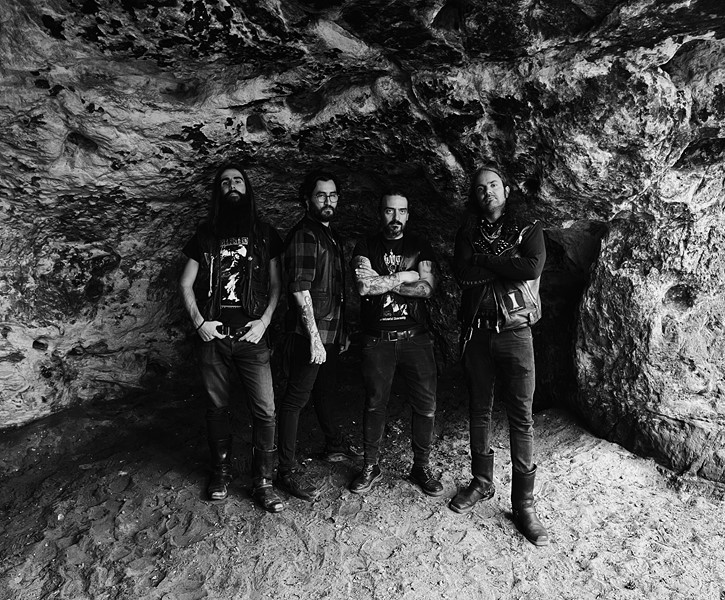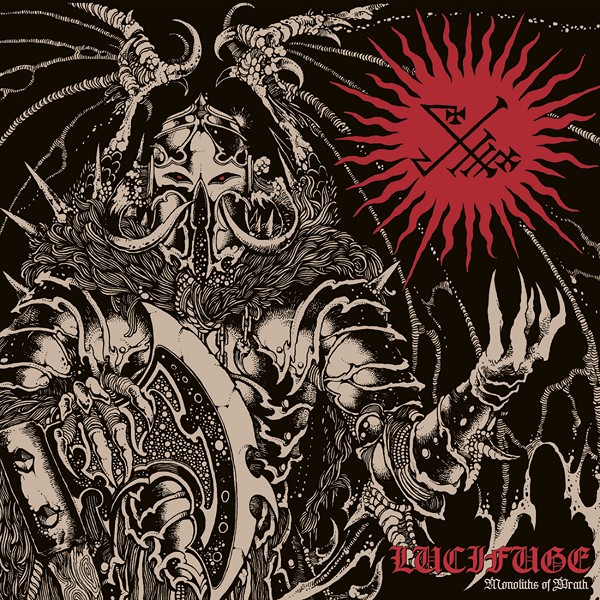 Hail! Congratulations on the release of your highly anticipated fifth album, “Monoliths of Wrath”. How do you feel about the finished product?
Hail! Congratulations on the release of your highly anticipated fifth album, “Monoliths of Wrath”. How do you feel about the finished product?
Thanks! It was a record that I put a lot of thought into creating unique sound structures that wouldn’t sound like a copy of “Infernal Power” so I tried to push my limits into songwriting, and playing as tight and aggressive as possible. I think the album is a big step into finding our own identity, while still trying to keep the influences from early Thrash and Black Metal.
Your sound has been described as blackened speed metalpunk. How did you arrive at this style, and how has it evolved over the years?
At the beginning, my idea was to do a band that would be pretty much a tribute to Venom, Hellhammer and Bathory, and these bands have been my biggest influence, although I feel that they were influenced by NWOBHM and early Punk and Hardcore Bands, so I tried to put all those influences into my songwriting. I feel that with the years Lucifuge has evolved and became more evil and a bit more technical, but still the fundaments are the same.
“Monoliths of Wrath” features more technical elements and thrash-oriented sound, taking cues from classic bands like Sodom, Kreator, Exodus, and Slayer. How did you approach incorporating these influences into your music while still maintaining your own unique sound?
That has been the biggest challenge: writing songs that have the songwriting style from Sodom, Slayer and Kreator, but not ripping them off… So I started by recycling some riffs that I had recorded for demos, and adapting them to classic thrash drum beats, trying to leave out the Motörhead riffs to add more complex thrash melodies. There was already some of that in Infernal Power and the Split LP with Bunker 66, but on “Monoliths of Wrath” I tried to dig deeper into those unexpected twists, changes and breaks.
“Monoliths of Wrath” also includes almost-atmospheric black metal passages. What inspired this addition, and how did you integrate it into the album as a whole?
I guess this comes on one hand from listening to Bathory “Under the sign of the Black Mark” which I feel is one of the biggest inspirations for Norwegian Black Metal, so I wanted to capture a bit of that essence of that album into the second part of “Monoliths” so that it would have a similar timeline where Persecution Mania and Under the Sign of the Black Mark and Reign in Blood came out, so I wanted to blend this era of Thrash and Black Metal, where there wasn’t still a clear difference between both genres.
Your music features themes of evil, blasphemy, and anti-religion. How do these themes reflect your personal beliefs and worldview?
I am an atheist and I believe that questioning the existence of God and the institutions like the Government and the Church is a part of becoming a free thinking individual, so I’ve been always trying to add interesting quotes from Nietzsche, Blake or Crowley that I find that reflects my feeling about religions into the lyrics from Lucifuge. I feel it makes it more relevant and interesting to read and sing along when there’s some actual thought put behind the lyrics of a band.
This is your first album to be recorded in a proper recording studio. How did this change the recording process, and what did you learn from the experience?
I started searching for a studio to record the next album, the previous records were all done in a shared practice room, so I had to have everything done before the other band was coming to practice, which made me always have that time limitation… and I found this small studio that was for rent, as the guy was moving out to a bigger location, so I ended up taking over the place, and a carpenter helped me do most of the renovations. Actually, it took me almost one year to finish building everything, and by the time of starting recording Monoliths, it was just half way done… So the album was more like recorded while building a studio, which had a lot of complications, and turned out taking way too long, but helped me to have everything set up in a way that now it’s very easy for me to record song ideas and have everything ready so that I can focus on the songwriting process.
The production on “Monoliths of Wrath” has been described as full-bodied and “pro” but hardly soft. How did you balance capturing your raw sound with achieving a professional sound quality?
I tried to use the same settings that we used when playing live, but having a studio with proper acoustic treatment just made a big difference. I also recorded on this amazing 32 channel analog console that I found on eBay, and it sounds just incredible… So it was a huge difference compared to the previous albums that were done on a small 8 channel console, and just recorded in a few days. I also found this sweet Jackson Rhoads guitar, and I tried to just improve some things that I felt were lacking from the previous record.
The album features some impressive song structures, with tempo variations and breakdowns reminiscent of classic thrash metal. What was the songwriting process like for this album, and how did you approach creating these complex structures?
On the structures I always remember thinking of some Slayer interview I read where Kerry King was saying they always like to change a riff before it gets boring, and to move into another part rather than going back, so I tried to write the songs without a verse and chorus structure in mind, rather thinking, what the song needs after this, and what would not be the obvious boring part that you would expect. I think that is one key ingredient in the brilliant songwriting from Slayer how the song structures start evolving from one killer riff into the next, and that was a big inspiration for this album.
The album is set for release in April 2023. What are your plans for promoting the album, and do you have any tour dates or other events planned to support it?
We are planning a tour in summer, playing Obscene Extreme Festival, and probably a few more Festivals in Europe.
Finally, what’s next for LUCIFUGE? Are there any new projects or collaborations on the horizon, and how do you see your music evolving in the future? Thank you!
I am already starting to work on the next album, which brings some more NWOBHM influences into the thrash sounds, so it’s a mix of the catchy riffs from Infernal Power, with the more elaborate structures from Monoliths of Wrath, and I am very excited with the first demos I ve been recording, so it will be proper follow up for this 2 albums. Thanks for the interview! Cheers!
If you really would like to support Antichrist, you can just Share our article.
You can also support Antichrist by sending a couple bucks to cover some webhosting expenses. =>> PayPal




